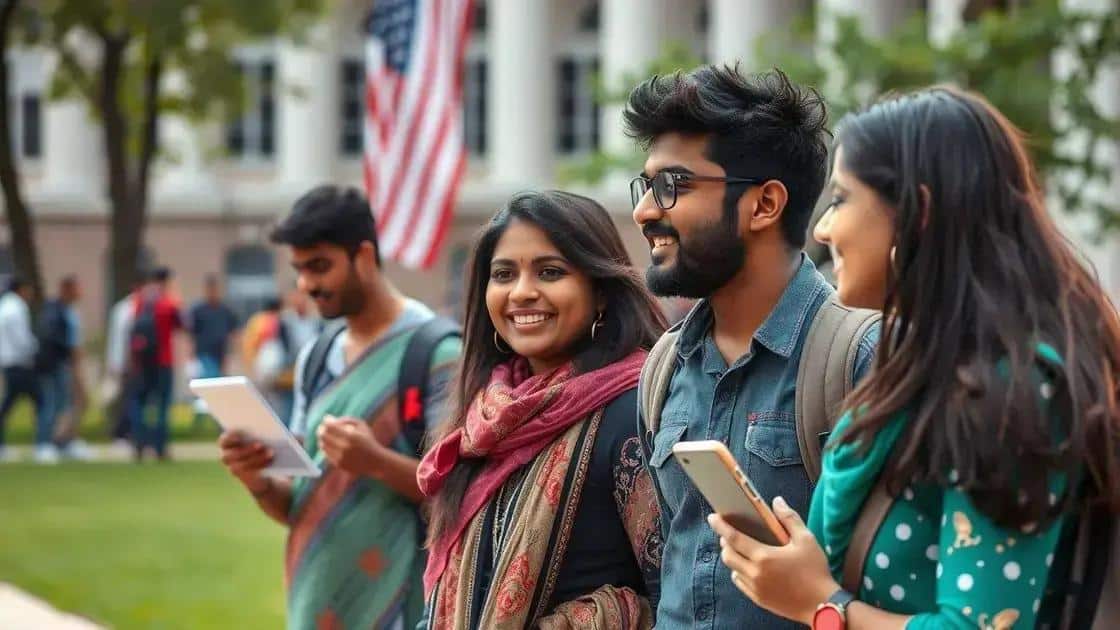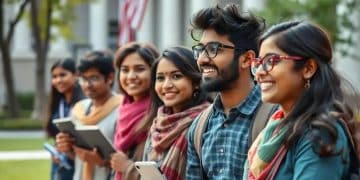Indian reality ki students are coming to America

Indian students studying abroad gain significant benefits, including cultural exposure, personal growth, and enhanced career opportunities while overcoming challenges like adjustment and language barriers.
Indian reality ki students looking to study in America often face unique challenges and opportunities. Have you ever wondered what it truly takes to make this dream a reality? Let’s dive into essential insights that can guide you!
Understanding the American education system
Understanding the American education system is crucial for Indian students aiming to study in the U.S. It can be quite different from what you may be used to back home. Knowing how the system works will help you adapt quickly and excel in your academic journey.
Key Features of the American Education System
The U.S. education system emphasizes flexibility and diversity. Courses can vary significantly in style and content. Generally, the system is divided into primary, secondary, and higher education. At colleges and universities, students can choose a major and take elective courses that pique their interests.
Types of Educational Institutions
In America, you’ll find a variety of institutions:
- Community Colleges: Offer two-year degrees and vocational training.
- Public Universities: Funded by the state, often larger in size.
- Private Universities: Independently funded, usually smaller with fewer students.
- Online Institutions: Offer degree programs entirely online.
Each type of school offers unique advantages, so it’s important to think about what suits your academic goals best. Coming to America, students must also navigate a system filled with various testing requirements, including standardized tests like the SAT and ACT, which are essential for college admissions.
Moreover, the grading system can be different too. Students are often graded on a scale from A to F, where A is excellent and F is fail. This grading system can feel competitive, but it rewards hard work and perseverance.
Cultural Nuances in Education
The classroom experience in America encourages participation and discussion. Professors often want students to express their views, which might seem less common in more traditional education systems. Building relationships with your professors can be beneficial for your academic and professional path.
Additionally, collaboration is key. Group projects and peer reviews are common, fostering a sense of community among students. Therefore, developing good communication skills will greatly enhance your experience.
Understanding these aspects of the American education system will empower you to make more informed choices. It provides the foundation for your success and personal growth as an international student. Being aware of these nuances will certainly help ease your transition into this new academic environment.
Visa process for Indian students

Visa process for Indian students aspiring to study in the U.S. is a crucial step that requires careful attention. Understanding this process will not only help you prepare but also make your transition smoother.
Types of Visas
The most common visa for students is the F-1 visa, which allows you to study full-time at an accredited institution. There are also M-1 visas for vocational or non-academic studies and J-1 visas for exchange programs. It is essential to choose the right type based on your educational goals.
Steps to Apply for a Visa
The visa application process involves several key steps:
- 1. Get accepted by a Student and Exchange Visitor Program (SEVP) approved school.
- 2. Pay the SEVIS fee after receiving your Form I-20.
- 3. Fill out the DS-160 form for the nonimmigrant visa application.
- 4. Schedule your visa interview at the U.S. embassy or consulate.
After scheduling your interview, it’s important to prepare the required documents. Make sure to gather proof of financial support, a valid passport, and your acceptance letter. The interview is your chance to demonstrate your intentions clearly and answer any questions confidently.
Interview Tips
During your visa interview, be honest and straightforward. Be ready to explain why you chose the specific school and how the education will benefit your future. It’s crucial to show your ties to India, such as family, job prospects, and property. This demonstrates your intent to return after your studies.
Moreover, receiving your visa approval depends not just on your qualifications but also on how you present yourself. Being relaxed and prepared can significantly influence the interview outcome. Make sure you understand the visa conditions and adhere to them while you study in the States.
The U.S. visa process can be complex, but with the right preparation, you can increase your chances of success. Understanding each step will help you navigate the journey from application to arrival with confidence.
Cultural adjustments in America
Cultural adjustments in America can feel overwhelming at first. Moving to a new country involves adapting to different ways of life, language, and social norms. Understanding these elements will help ease your transition.
Daily Life Differences
In America, daily routines may differ significantly from those in India. For example, meals can be more casual. Many students eat on the go, or there may be a greater variety of fast food options. You might also notice that social interactions are generally more informal.
Communication Styles
One key adjustment involves communication. Americans tend to value directness and brevity. Being straightforward in conversations is appreciated, and it’s common to share opinions openly. Building relationships may take time, but participating in class discussions or joining clubs can help you connect with others.
Social Etiquette
Understanding social etiquette can also help you fit in. Here are some important points to keep in mind:
- Being punctual is important; arriving on time shows respect.
- Politeness is valued; use “please” and “thank you” regularly.
- Personal space is preferred; it is common to keep some distance during conversations.
- Asking questions is encouraged; don’t hesitate to seek clarification when needed.
Adjusting to these cultural norms can take time, but small efforts can lead to big changes. Embracing the differences will enrich your experience and help you build meaningful connections.
Finding Community
Participating in cultural events can also ease the adjustment process. Look for gatherings or clubs that celebrate Indian culture or events that introduce you to American customs. Connecting with fellow students, both local and international, can provide support. Shared experiences will make the transition feel less isolating.
As you navigate these cultural adjustments, remember that it’s normal to feel a mix of excitement and nervousness. Each step you take towards understanding American culture will help you grow personally and academically.
Success stories of Indian students abroad

Success stories of Indian students abroad showcase the potential and resilience of those who take the leap to study in foreign lands. These inspiring tales often highlight the journeys of students who have faced challenges and emerged victorious.
Building a Bright Future
Many Indian students have achieved remarkable success in various fields after studying abroad. Take the example of students who have pursued engineering or medicine; they often utilize their education to make significant contributions in their home country or globally.
Adapting to New Environments
Adapting to a new culture can be daunting, but many students have turned challenges into opportunities. Their stories reflect personal growth, as they build friendships with diverse groups and embrace different ways of thinking. Here are some common themes in these success stories:
- Developing strong communication skills through interaction with peers.
- Understanding global perspectives that enhance their career prospects.
- Participating in internships that provide practical experience.
- Overcoming language barriers and academic challenges.
These experiences shape students into well-rounded individuals, ready to face the complexities of the modern workforce. For instance, several alumni have launched successful startups or landed jobs at top companies worldwide.
Community Support
Another aspect of these success stories is the support system that students create. Many find mentorship from senior students or faculty, leading to valuable guidance throughout their academic journey. Engaging in student organizations or cultural clubs also plays a pivotal role in building a sense of belonging.
Furthermore, many students document their journeys through blogs or social media, inspiring others considering studying abroad. By sharing their struggles and achievements, they encourage future students to pursue their dreams.
Success stories highlight the transformative power of education and the diversity of paths one can take. They serve as motivation for aspiring students and remind them that with effort and persistence, they can achieve their goals.
FAQ – Frequently Asked Questions about Indian Students Studying Abroad
What are the common challenges Indian students face while studying abroad?
Common challenges include language barriers, cultural adjustments, and homesickness. Adaptation takes time, but support systems can help.
How can Indian students find support while studying in the U.S.?
Students can join cultural clubs, seek mentorship from peers, and engage with support services provided by their institutions.
What are the benefits of studying abroad for Indian students?
Studying abroad offers exposure to diverse cultures, better career opportunities, personal growth, and enhanced global perspectives.
How can Indian students share their success stories?
Many students share their journeys through social media, blogs, or university newsletters to inspire others considering studying abroad.





